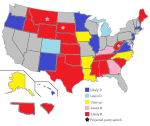Dave Brat’s upset victory against Eric Cantor in Virginia’s 7th district Republican primary has rightfully reenergized the Tea Party. Eric Cantor, after all, is the archetype of a big-government conservative, favoring expensive policies like military adventurism abroad and NSA spying at home. His stunning defeat sends an unquestionable message to the Republican establishment that they are out of touch with the American electorate.
Videos by Rare
However, Cantor’s chums aren’t the only ones who should be worried about the future in the wake of Tuesday’s upset. Brat’s staunch opposition to amnesty for immigrants currently living in the U.S. is both economically illiterate and unpopular among voters, pointing to an urgent need for Republicans to change their attitude towards the millions of undocumented families currently residing in the country.
Brat made amnesty the primary issue of his campaign, preying upon Eric Cantor’s support of immigration reform to alienate the incumbent from the Republican base.
“Eric Cantor believes that we need to import more low-wage foreign workers at the expense of lower wages and fewer jobs for Virginia families,” the college professor told The Richmond Times-Dispatch on Monday.
On his website, Brat is even further unapologetic about amnesty, pointing out Cantor’s support of the “Kids Act” that would have provided a path to citizenship for children of immigrants.
While his victory is proof that anti-immigrant fervor is a winning platform in a Republican primary, Brat should keep in mind that a general election is a whole different ball game. Opposition to amnesty does remains popular among the tea party, but most Americans on the contrary support a legal pathway to citizenship.
According to a recent poll by the Public Religion Research Institute and Brookings Institution, 62 percent of Americans believe that undocumented workers should be allowed to gain citizenship if they pass certain requirements such as a background check. On the other hand, a mere 17 percent of Americans support deportation.
This could prove challenging come November.
Even if Brat comes out victorious in the general election, tea party Republicans must eventually change their anti-immigrant ways lest they alienate future voters as well.
According to a recent Pew Study, Millennials are the most ethnically diverse generation in America’s history. Furthermore, they support immigrants in record numbers, with an overwhelming 80 percent favoring a legal path for undocumented people to remain in the U.S.
While it remains to be seen how long anti-immigrant fervor can win elections in the near future, the long-term trend is clear that Republicans must support reform or lose touch with the electorate.
Politics aside, economists agree that laxer immigration policies stimulate American markets, providing the labor and ingenuity that the country so desperately needs. Even conservative think tanks like the Manhattan Institute agree that simple reforms, like expanding H-1B visas to high-skilled immigrants, could create billions of dollars in GDP for the American economy. After all, immigrants are 30 percent more likely to start a business than native-born Americans, as one study by the Cato Institute demonstrates.
As an economics professor, Brat should be well aware of these facts. However, he has instead decided to favor political populism over economic consensus.
What he and his tea party companions fail to realize is such anti-immigrant populism is no longer popular among the American people.
For the sake of our country’s economic future, they should change their ways or risk going the way of Cantor.



